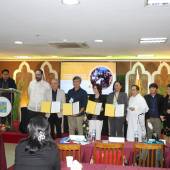Pope Francis discusses education with faith leaders on World Teachers’ Day

Religious leaders from different faiths met at the Vatican on October 5 to discuss education on World Teachers’ Day.
The interreligious meeting on October 5 included Orthodox, Muslim, Jewish, Buddhist, Sikh, Jain, Calvinist, Quaker, and evangelical representatives who gathered together with Pope Francis.
The group released a joint statement following the meeting urging teachers to commit to “researching new ways of understanding the economy and politics, as instruments at the service of people and the entire human family, and with a view to a holistic ecology, by teaching lifestyles that are more respectful of the environment.”
The meeting was part of the Global Compact on Education launched by Pope Francis in October 2020.
The religious representatives also called for forms of education that put “the human person at the center of every educational process” and respect “women’s dignity so as to build with them a future of justice and peace.”
Ecumenical Patriarch Bartholomew I of Constantinople and Ahmed al-Tayyeb, the grand imam of al-Azhar in Cairo, Egypt, were among the participants, along with Ayatollah Seyed Mostafa Mohaghegh Damad from Tehran, Iran, and a representative of Venerable Master Hsin-Tao, the founding abbot of Ling Jiou Mountain Buddhist Society.
Pope Francis addressed the religious leaders in the Clementine Hall of the Apostolic Palace.
“Religions have always had a close relationship with education, accompanying religious activities with educational, scholastic and academic ones. As in the past, so also in our day, with the wisdom and humanity of our religious traditions, we want to be a stimulus for a renewed educational activity that can advance universal fraternity in our world,” the pope said.
“If in the past, our differences set us at odds, nowadays we see in them the richness of different ways of coming to God and of educating young people for peaceful coexistence in mutual respect.”
The pope said that the key to a more fraternal world was the education of young people to appreciate one another “regardless of where he or she was born or lives.”
“If in the past, the rights of women, children and the most vulnerable were not always respected, today we are committed firmly to defend those rights and to teach young people to be a voice for the voiceless,” he said.
Pope Francis also stressed the need for educators to train future generations in “more sober and ecologically sustainable lifestyle.”
“Education commits us to love our mother Earth, to avoid the waste of food and resources, and to share more generously the goods that God has given us for the life of everyone. I think of what one thinker, not a Catholic, used to say: ‘God always forgives, we occasionally forgive. Nature never forgives,’” he said.
At the end of his speech, the pope asked each religious leader to spend a “brief moment of silence, asking God to enlighten our minds so that our dialogue will bear fruit and help us courageously to pursue the paths of new educational horizons.”
Radio Veritas Asia (RVA), a media platform of the Catholic Church, aims to share Christ. RVA started in 1969 as a continental Catholic radio station to serve Asian countries in their respective local language, thus earning the tag “the Voice of Asian Christianity.” Responding to the emerging context, RVA embraced media platforms to connect with the global Asian audience via its 21 language websites and various social media platforms.














